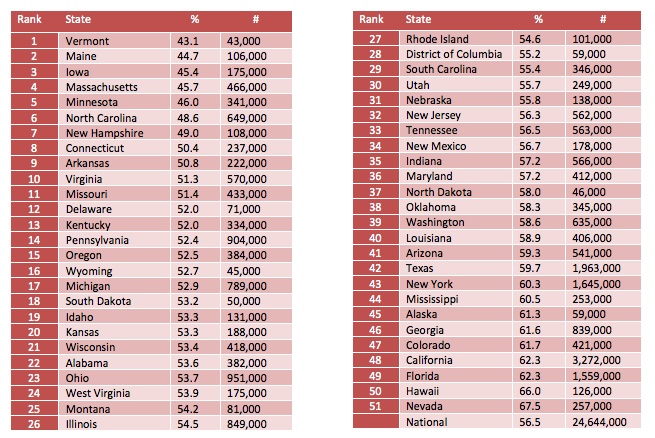When It Comes To Mental Health Care, We Are Not All Equal
Team Strong 365

If you or a loved one were in need of mental health treatment and could move anywhere in the U.S. to get it, where would the best (and worst) place be? That’s one question tackled in a comprehensive report by Mental Health America, The State of Mental Health In America 2017. The report found not only great disparity in the ability to access to care across the states, but enormous room for improvement even at the top of the ranks.
If you could go anywhere, you would certainly cross Nevada, Hawaii and Florida off your list, states where more than 60% of adults are not receiving care for mental health conditions. But, even in states with the very best access to care, lack of treatment for brain disorders is still alarmingly high, ranging between 43-45% for Vermont, Maine and Iowa.
Overall, 57% of adults with a mental illness receive no treatment in the United States.
Why?
Access to insurance and mental health care have both improved in recent years. However, lack of funding for quality local treatment, insurance parity for mental health, understanding one’s own symptoms and stigma continue to be significant hurdles for people in need of treatment. One extreme example of mental health care provider shortages is Alabama, with only one provider per 1,200 people.
MHA’s Ranks the States by Access to Mental Health Care

Source: MHA’s State of Mental Health Care In America 2017 In addition to funding needs for quality care providers, a prevention-based approach will make a big difference in shaping what this report looks like in the years ahead. In order to prevent many of the downstream effects of untreated brain disorders such as school dropout, incarceration and suicide, we must begin to better support kids in schools, which includes mental health curricula and training teachers and other youth influencers in the community how to look out for and support someone with a developing brain disorder.
We must also each do our part to further a larger social change movement that challenges us to perceive our brain health in the same way we do every other aspect of our health. Normalizing brain-based illnesses isn’t just a “feel good” idea; its concrete impacts are backed by scientific evidence. The shedding of prejudice, discrimination and mistreatment of people with mental illnesses will allow us to more readily recognize and act on challenges when they first appear and are most treatable — a new paradigm that could dramatically alter the futures of millions of young Americans, and especially the 100,000 of young people who will face psychosis for the first time each year.
A few other notable highlights from the report:
> “Over 40 million Americans are dealing with a mental health concern—more than the populations of New York and Florida combined.”
> “Over 1.2 million people currently reside in prisons and/or jails with a mental health condition and lack of access to mental health care is linked with higher rates of incarceration.”
> “Youth mental health problems are on the rise, and 6 out of 10 young people with major depression do not receive ANY mental health treatment.”
If you take away one thing from the report’s dizzying (and largely dismal) array of statistics, may it be this: every number is a real person. It is you and it is me. It is my brother, your son, friend or daughter.
May these numbers represent a rally cry to action for ALL of us — the one in five Americans who are facing a mental illness today and the five in five who know someone who deserves the very best mental health care right now and most likely isn’t getting it.
Gaps in treatment availability, access to care and horrifying incarceration statistics all represent lives that we have the power to change through policy and social change, education, advances in research and implementing equal access to the most effective treatment models available today.
Please join us in taking action today. Submit a story or note of encouragement, give what you can or volunteer to enable us to connect more young people to effective care earlier.
Curious how your state ranks? Check out the full report.
Feature image by Caio Siqueira.
The strength to persist and thrive through mental health struggles exists in all of us. 🫶🏽
Join our Strong365 Community on Instagram, Facebook, and Twitter to keep the conversation going. Or, learn how you can get involved to support us on our mission for mental health.
